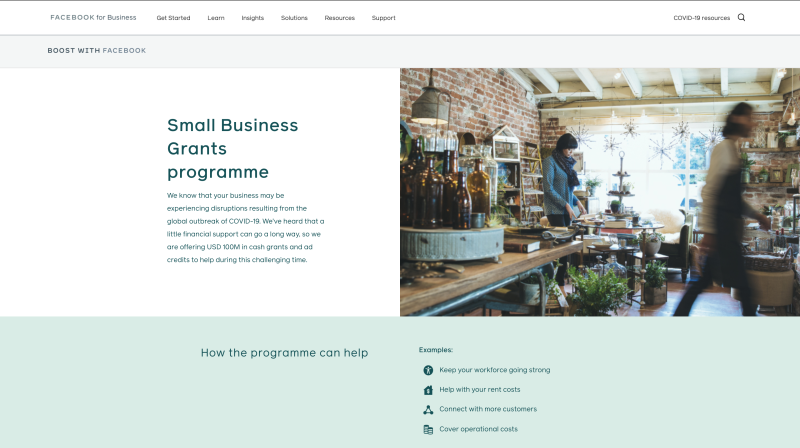Start-Ups, Here’s What to Expect and How to React to Coronavirus

Few events in human history come close to the impact the coronavirus has had so far.
With a human cost on a global scale coupled with an inevitable economic downturn, the world is a very different place than it was even 3 months ago.

Because we’re right in the middle of it, it’s tough to make any informed decisions — especially as a business.
And if you’re a start-up, that’s incredibly unsettling.
The startup phase
The startup phase of any business is wrought with potential pitfalls and problems… and that’s at the best of times! To do it all during a global pandemic, with the risk of a downturn on the horizon, is even trickier — but it’s not impossible.
If you’re a founder, you can probably identify with the feelings we’re describing, but we want you to know that you’re not alone. As always in life, knowledge is power. So with the right tactics and informed decision-making, we know you can weather the storm.
In the meantime, the airfocus team has put together an essential guide for start-ups during the COVID-19 panic: where we’ve been, where we’re going, and what to expect.
The immediate effects of the coronavirus pandemic on business
The rapid spread of the coronavirus has brought with it some truly astonishing changes to the business landscape.

In fact, the adaptability shown by businesses across the globe in the face of this crisis is a testament to the resilience of the human race.
But how have businesses changed? What impact has coronavirus had so far, and how are companies making changes to deal with it?
Let’s look at some examples from across a range of industries...
Changes to consumer behavior for B2C companies. There’s no question that the B2C space has been hit particularly hard by the coronavirus outbreak. Whether it’s retail shops, wedding photographers, aviation companies, hotels — they’ve all suffered significantly. As tough as this has been for these companies, don’t forget that consumers don’t simply stop spending. In this case, retail spending will almost certainly move exclusively online, which becomes an opportunity for clicks-and-mortar or pure-play businesses.
Businesses are spending differently on B2B options. Just because B2C has been hit hard doesn’t automatically mean that it’s plain sailing for B2B. Every business is different, of course, but don’t forget that there’s often a chain effect for B2B companies. The businesses they serve might see drop-off due to B2C shifts. It’s complex, sure, but the bottom line is that businesses are also likely to spend more wisely on B2B services that don’t have a clear ROI.
Marketing channels are shifting to adapt. As mentioned above, the almost total shutdown of the High Street has led consumers to the only place they can continue to spend unabated: online.
![online shopping]()
For anyone working in media buying, the shift will be as clear as day: above the line and OOH (out of home) advertising channels will be minimized, and online ads will become the primary focus. This is worth remembering because increased competition in the online ad space will drive up the cost-per-click on platforms such as Google Ads in competing markets.
We get it. These aren’t exactly the most uplifting or promising of circumstances, but there’s always a silver lining.
If you can manage to maintain a little optimism throughout this period, you’ll be able to either power through or pivot (whichever is best for your business).
But that won’t happen on its own, so there are two things you need to do:
1. Consider how the business landscape may continue to change
2. Make contingency plans now to be prepared for what happens next
Let’s take a look at each of these in more detail.
What to expect in the months ahead as a founder
As any business person will tell you, there’s no predicting exactly what will happen in a business — and that goes for any day of the week!
The right approach
As a founder, however, it’s essential that you at least consider the changes that may come as a result of the global pandemic. Do nothing and you could risk everything, but even the smallest of nudges in a different direction can be the secret to unlocking future success.
That’s easy enough to say, so let’s get a little practical. Here are some steps you can take to prepare to push your start-up forward in the next 3, 6, 12 months, and beyond.
Tear up your business plan. Okay, there’s no need to be that dramatic, but you should definitely understand that whatever your plan was before the pandemic will have to change. That might trigger a few palpitations, but try not to worry too much. In fact, it’s possible to frame this as a positive. Sometimes situations like this, outside of your control, force you to look at things differently and find new solutions you might never have considered before. How’s that for a bright side?
Tighten those purse strings. This should go without saying, but there’s no doubt that the global pandemic will lead to a downturn and, very likely, a recession in many countries. Whether this happens or not, it’s a good idea to be extra careful about your start-up’s spending, at least for the next 12 months.
![cut spendings startup]()
Adjust your go-to-market strategy. Whether you’re starting with an MVP or have a fully developed product right now, it might be worth holding off just a little longer. Your go-to-market strategy is an essential aspect of your start-up’s early success, and the day-to-day is so volatile right now that risk is far higher. And unless your product happens to be perfectly suited to the new normal (like you’ve put all your money behind VR group workouts), consumers probably aren’t ready to listen. Instead, bide your time over a few months if you possibly can, or consider a pivot as a last resort (more on this later).
Reconsider your marketing channels. We’ll talk more about the short-term effect of the crisis on marketing channels later on, but it’s definitely worth thinking about the long-term, too. There’s certain to be increased competition in the online ad space, but don’t let that stop you from being creative. In fact, once the crisis abates, everyone will want to go outside. S o 6 months from now, out-of-home advertising might be very effective indeed (and cheap, too).
5 things you can do today to prepare your business
So, that’s your long-term planning sorted, but about the short-term? What about today?
There’s absolutely no doubt that given the state of the world right now, a day can feel like a lifetime. But the rapid development of events requires you to be adaptable, too. And there are plenty of ways to do that.
Preparing your start-up for whatever the coronavirus crisis may bring is a tall order. After all, as a brand new business, you don’t know what tough market conditions look like even when the waters are calm. In these rough seas, you’re certain to feel a little lost.
But don’t worry. We’ve come up with what we believe are the most important things to do right now as a business. After all, as the old saying goes: action is the antidote to despair.
So let’s get down to action.
1. Accept that this is the new normal (at least for a while)
Acceptance is a powerful tool.
There’s a natural inclination to ignore, minimize, or otherwise try to discount life-changing scenarios like the coronavirus. But that way of thinking isn’t going to help.
The new normal
If you’re still struggling with the idea that this will change the world, or you’re hoping everything will go back to normal next week, we’ve got bad news: this is the new normal. Okay, it might not be the normal you wanted or planned for, but it’s the one we’ve got. The great thing is that once things settle — and maybe even sooner — you’ll be able to adjust your start-up’s plan in the context of this new world.
But even if the worst happens and we face a global recession, it still doesn’t mean it’s the end. We’ll share more on that shortly.
2. Make sure you’re set up to work from home
Once you’ve got your mindset locked and ready to go, it’s time to get practical. The first step won’t come as any surprise: make sure you can work from home. After all, with a quarter of the world’s population in COVID-19 lockdown, there’s really not much choice.

Fun fact, the setup from the image above is the home office setup of our colleague peer.
Beyond the usual stuff like fast internet access and a computer capable of real work, it’s a smart idea to carve out a specific area at home that’s designated as a “work-only” zone.
This will help you (and those you live with) keep things nicely compartmentalized to minimize disruption and allow you to focus when you really need to.
On top of that, you’ll also want to think about how you’ll actually do your work on a day-to-day basis — especially if you have a team.
Platforms such as Slack and Microsoft Teams are great for staying in touch with one another. And, of course, if you need a roadmapping or prioritization tool, we’d always recommend airfocus.

A quick note on team working during coronavirus lockdown: you may find that group decision-making becomes a little trickier when you’re all dialing in from other ends of the city or country.
And you will likely come across a few difficulties with resourcing and team morale — all of these complications can easily be taken in your stride if you know how.
Head over to our blog to read our guides on remote decision-making and how to care for remote working teams.
3. Look for extra funding (if you really need it)
It’s crystal clear at this point that some businesses won’t get through this crisis without a little extra help. While the government is doing what it can to buoy small businesses, you might find yourself falling through the cracks as a start-up.
If this is the case, and you need funding to get through this, don’t give up. As the days go on, more and more private financial options are appearing. One great example is the recent announcement of Facebook’s Small Business Grants Program.

Funding like this can be an absolute lifesaver as a start-up. So if you’re offered a grant, grab it with both hands.
The value of a grant lies in the fact that — unlike a loan — there’s no need to pay it back.
f your start-up has a high monthly burn rate, a grant like this can keep you afloat just long enough to get through the worst months of the crisis and back on dry land.
4. Plan for the worst (but hope for the best)
As we mentioned earlier, there’s every chance that the COVID-19 pandemic will result in recession for many countries.
With global economies essentially put on hold, especially in the consumer space, this would come as no surprise.
When you’re looking at your business today, try to imagine how a recession may impact your immediate plans. For example, you may mark a reduction in spend on your financial projections. Being 100% honest with yourself and planning for that worst-case scenario can help you prevent overspending and keep you agile when you need it most.
As scary as a recession may seem, however, don’t forget that it can present opportunities, too. It’s a chance to show your customers how indispensable you are, an opportunity to diversify revenue streams, a challenge to improve your core services, and more. It’s all about how you frame it.
5. Don’t be afraid to adjust your customer offering
There’s absolutely no shame in looking at this crisis and asking how it changes consumer behavior through the lens of your own offerings.
After all, if you’re going to survive it (and you will), you’ll need to know what the customer really wants.
And right now, that demand has entirely shifted from where it was even a month ago. Need an example? Consider how in-demand video conferencing services are right now, or restaurant delivery services, or even online supermarkets.
All of these are market conditions, yes, but they’re also teaching you something about where you might want to go next. If your current product offering is tailored towards one of the industries that’s certain to be adversely affected by the coronavirus, don’t worry. It’s never too late to pivot. And to pivot correctly, you need to understand how markets shift and change.
Take some time every day to track what matters to you, then use that information to inform your next business plan (if it needs to change at all).
What to expect? No one really knows, but there is a light at the end of the tunnel for those who want to see it
The truth is that nobody has a crystal ball.
Nobody can tell you exactly what will happen to your business, or your employees, or even the world economy as a whole.
That said, we remain eternally optimistic, and we very much hope that the techniques and strategies we’ve shared here will help you to make it through. When (not if!) you get to the other side, we hope you’ll feel galvanized and ready for whatever life has to throw at you.


Andrei Tiburca

Read also


Create effective product strategy

Experience the new way of doing product management








